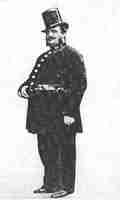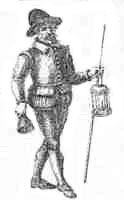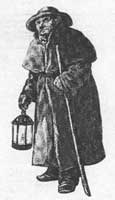| The Hue and Cry still existed as the method of pursuit of offenders and localities were still liable to be fined if they did not catch and prosecute their criminals.
The Parish Constable was appointed by the parish and the records of his office and duties would be kept in the Parish Chest.
Like the 'Special' of today, the Parish Constable was unpaid, apart from small allowances, with his duties extraneous to his normal work. He was answerable to the Chief Constable of the Hundred. Failure to effect their duties resulted in their appearance before the Justices. Irregularities were obviously abounding and as a result regulations were drawn up by the Justices [Bucks. County] in January 1712/13 - for redressing and preventing the many civil practices and abuses "which have been committed by the Chief Constable, the petty constable and by their agents" in and about the relieving and passing of vagrants through the County.
An insight into the various situations the Parish Constable encountered can be found in the transcribed Bucks. Sessions Records, held at Milton Keynes Reference Library. They include - reporting to the Sessional Court instances of refusing to keep watch; for refusing to execute a warrant; indictment for a pound breach and taking cattle distrained out of the common pound; instance of a conviction for swearing [52 oaths]; arranging the horses and carriages for soldiers baggage belonging to a troop of dragoons; the offence of erecting a building without four acres of land; failure to repair the highway; the keeper of the County gaol for allowing prisoners to escape; and for using scurrilous language and calling one a rogue.
|
| Towards the end of the 17th century, the above records reveal an enormous number of persons reported to the sessional Court by the Parish Constable for failure to attend church. Here an absence of four weeks would result in a twenty pound fine and double pro-rata. An ordinary labourer could only earn eight pounds per annum, thus the houses of Correction - the Bridewells - would have been overflowing.
In 1859, three Parish Constables were appointed at Newport Pagnell, and a vote of thanks was extended to Charles Smith - cooper, of Silver Street, who had served in that capacity for 31 years.
I wonder if he was presented with a Long Service Medal ?
|

A Constable from the period around 1860
|
| In 1872, the year that the Newport Pagnell police station came into being, an Act was passed indicating that the establishment of an efficient police in the counties of England & Wales has rendered the general appointment of Parish Constables unnecessary:
After the 24th. March 1872, no Parish Constable is to be appointed except when deemed necessary by the Quarter Sessions. A paid constable may be appointed for a parish on the application of the vestry, the paid constable already appointed to be continued in office.
On Monday 15th. July 1872, a meeting took place at the vestry of the parish church at Newport Pagnell for the purpose of appointing surveyors of the highways , and for nominating Overseers of the Poor, and Parish Constable. An adjournment was made for the remainder of the meeting to be held at The Swan Hotel [now The Swan Revived], when Mr. G. Higgins and Mr. J. Shackshaft were elected as Parish Constables.
It is interesting to note that references are held in the Newport Pagnell Museum, showing the police, as late as 1916, having attended 'Divine Service'. This entry in the station occurrence books was highlighted in red ink, and checked regularly by a senior officer. A further indication of this practice us shown on a testimonial to Inspector Floyd Anthony, who retired in 1911 from the Bucks. Constabulary, having served over 30 years, the last fourteen as Inspector at Newport Pagnell, In addition to receiving a cheque for £51 [a quarter year's salary], and two easy chairs, he was presented with 'hassocks' - church kneeling mats.
Imagine Milton Keynes on a Sunday morning with an arresting situation in hand, and the officer carrying out his duties, releasing the individual in order to attend Divine Service! The villains would have a field day.
 P.C. Mick Shaw, currently a serving officer at Newport Pagnell, is compiling research material on former members of the Bucks Constabulary and has launched a website on the history of the force. He would appreciate photographs and details of membership to augment his book entitled 'Over 100 years of Hanslope and Castlethorpe Village Policemen'. This book is available at the museum. Email P.C. Mick Shaw or visit his website P.C. Mick Shaw, currently a serving officer at Newport Pagnell, is compiling research material on former members of the Bucks Constabulary and has launched a website on the history of the force. He would appreciate photographs and details of membership to augment his book entitled 'Over 100 years of Hanslope and Castlethorpe Village Policemen'. This book is available at the museum. Email P.C. Mick Shaw or visit his website
|
![]()





 P.C. Mick Shaw, currently a serving officer at Newport Pagnell, is compiling research material on former members of the Bucks Constabulary and has launched a website on the history of the force. He would appreciate photographs and details of membership to augment his book entitled 'Over 100 years of Hanslope and Castlethorpe Village Policemen'. This book is available at the museum.
P.C. Mick Shaw, currently a serving officer at Newport Pagnell, is compiling research material on former members of the Bucks Constabulary and has launched a website on the history of the force. He would appreciate photographs and details of membership to augment his book entitled 'Over 100 years of Hanslope and Castlethorpe Village Policemen'. This book is available at the museum.